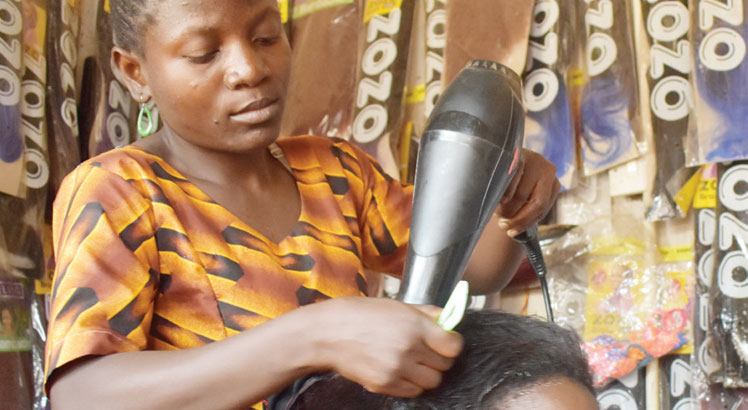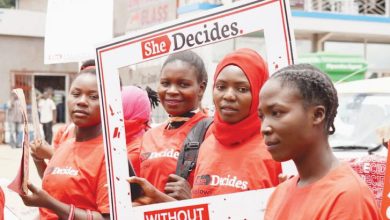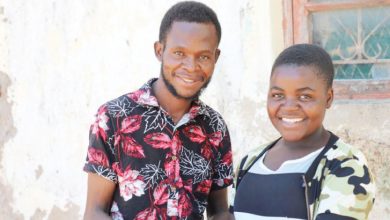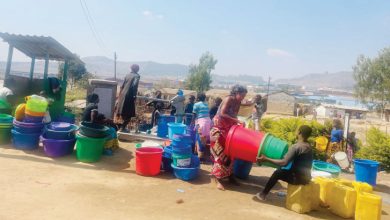Minigrid powers rural businesses
Many Malawians grow up hearing that their wealth is in the soil.
The philosophy popularised by founding president Hastings Kamuzu Banda has taken root across Bwanje Valley in Dedza.
“We make money come rain or sunshine,” brags Lasca Wilson. “If not in our irrigation scheme, you just have to position yourself well in its way.”
The 32-year-old farmer runs a hair salon at Mthembanji Trading Centre near Bwanje Irrigation Scheme.
She is among emerging businesspersons tapping the money trickling from the food basket for Dedza and surrounding towns.
All day, the mother of three attends to customers yearning for smashing hairdos.

Her work got easier when she connected the salon to a solar-powered minigrid established by Self-Help Africa in 2020 with support from the United Nations Development Programme and University of Strathclyde in Scotland.
The electrification project also lent Wilson K200 000 to buy electric appliances she can use to start or boost businesses.
About 30 locals got the loan to spur productive use of electricity for improved livelihoods and community development.
Wilson bought a hair blower and straightener that have made her shop a preferred stop for trendy hairstyles. She also purchased some chemicals, mesh and synthetic hair extensions for sale.
“I opened this shop to put the skills I acquired in Lilongwe City to good use, but it has become the main source of income for my family because many people come to make their hair here,” she says.
Wilson left the capital city after two years in protest against low pay.
Her shop gives her over K100 000 a month, more than the minimum wage pegged at K90 000.
“The business peaks during the harvesting season. When rice sales begin, I get 20 to 25 customers a day, which provides enough income for my family needs.
The new equipment has made her rented shop a go-to place for many women and girls in the neighbourhood.
“I’m saving to pay back the loans and build my own shop,” she says. “I also want to electrify my home because I know how electricity transforms life.”
Fredrick Jumbe, 35, needed no convincing when he borrowed K200 000 to add a welding workshop to his four grocery shops.
“I will add K180 000 from the current businesses to buy a welding machine because there is none here,” he says. “My vision is to use electricity not only to fix broken ploughs and bicycles, but also making new oxcarts for hauling farm inputs and crop yields.”
Jumbe envisages his neighbours acquiring assets they once bought in Lilongwe, almost 150 kilometres away.
“Putting electricity to good use is changing our area as people own equipment and improve the quality of life that once made them to go to towns. Now the towns are coming to rural areas,” he says.
The minigrid has created jobs for the youth, with some young men seen running barbershops, computer businesses and printing. They no longer have to flee to town for better economic prospects.
Like Jumbe, many shop owners now sell cold drinks from humming refrigerators powered by solar energy.
The power of the sunlight has increased work hours for hard workers.
“We used to close shops before sunset, but we no longer chase the sun. We run our businesses from 6am till late in the night. More hours mean more money,” said Jumbe.
The farmers obtained the loans through Cumo, a microfinance organisation founded by Concern Universal, now renamed Self-Help Africa.
“This is not aid, but a business boost,” says Cumo business coordinator Matamando Koko. “We often give loans to groups, but we targeted individuals because they don’t own licenced businesses. We hope they will use it wisely to raise their quality of life, own businesses and acquire assets.”
The African Minigrids Programme demonstrates innovative business models that can encourage private sector participation in developing decentralised power systems, especially in rural communities with low access to grid power.
African Minigrids project manager Elizabeth Banda says: “We want to scope small loan opportunities and propose a suitable framework to support entrepreneurs operating around minigrids to access appliance financing for improved productivity and economic activity.
“The appliance financing initiative is currently being implemented in two mini-grid sites developed by Self Help Africa in Kudembe and Mthembanji Villages in Dedza.”
Self-Help Africa and its partners trained the mini-grid customers on the importance of using electricity productively to power small businesses.
However, many households lacked funds for business start-ups in rural areas where only four percent are connected to the national grid 44 years after the birth of the Malawi Rural Electrification Programme in 1980.
Banda says: “There is huge latent demand for electricity services in remote areas which the national grid will likely not reach for many years.
“Our project has shown solar mini-grids can offer this service in a cost-effective and impactful way when implemented effectively.”
Looking forward, she sees new businesses emerging and revenue increasing as the quality of goods and services on sale improve and lure more customers.
Banda envisions the appliance financing initiative being extended to all mini-grid sites nationwide to increase income-generating activities, stimulating job creation and economic growth in remote areas.
For Wilson, the future looks bright. “The business is rising as we are putting our skills and clean energy to good use, so are our livelihoods,” she says




